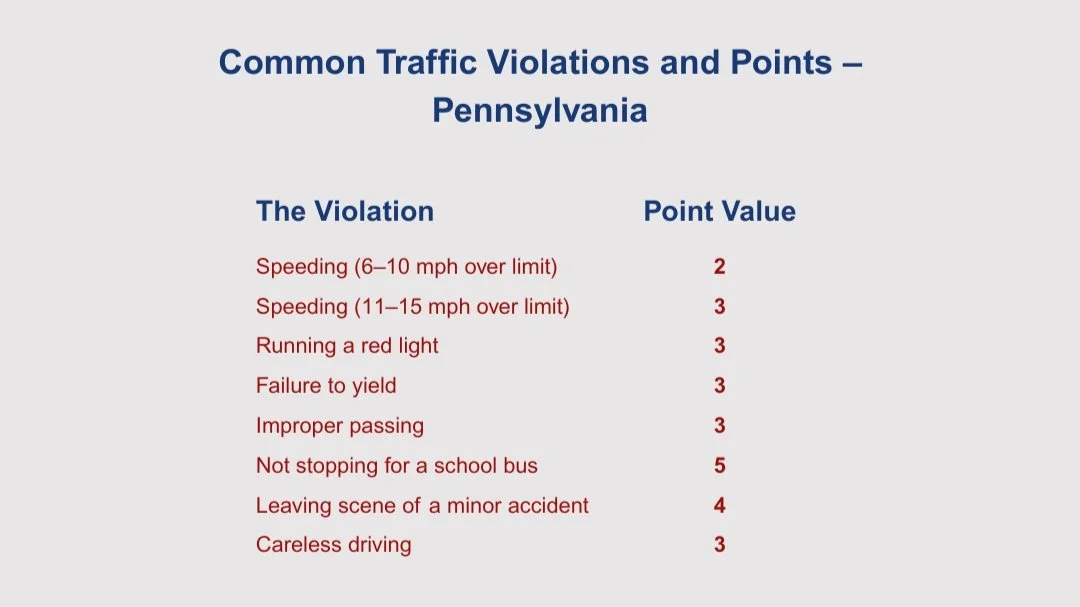Understanding the Point System for Traffic Violations in Pennsylvania
Pennsylvania operates on a point-based system to monitor and penalize unsafe driving behavior. Each moving violation carries a set number of points that go on your driving record. As points accumulate, the risk of license suspension increases—along with insurance costs and long-term consequences.
At Sutton & Lovette Law Offices, we help drivers understand how this system works and how to protect their driving privileges after a citation.
How the Point System Works
The Pennsylvania Department of Transportation (PennDOT) assigns points to a driver’s record when a moving violation occurs. These points are tracked over time and used to determine when further action—such as mandatory exams or license suspension—is required.
Examples of Violations That Add Points
Some of the most common violations that carry points include:
Speeding more than 6 mph over the limit
Running a red light or stop sign
Failing to yield the right of way
Improper passing or lane changes
Not stopping for a school bus
Leaving the scene of a minor accident
Driving carelessly
Each violation typically adds between 2 to 5 points to your record, depending on its severity. More serious offenses, such as DUI or reckless driving, may not add points but result in automatic license suspension or criminal charges.
What Happens When You Accumulate Points
When you reach 6 points on your driving record for the first time, PennDOT will require you to take and pass a written exam. Failing to do so within 30 days can lead to a license suspension.
If you accumulate 6 points a second time, you’ll be required to attend a PennDOT hearing. The result may include a 15-day suspension or a requirement to retake a road test.
For a third accumulation of 6 points, a mandatory hearing is held, and further penalties are likely—especially if you’ve had prior suspensions.
Once your record reaches 11 points or more, your license will be suspended. The length of the suspension increases with each offense or prior suspension history.
How Points Are Removed
PennDOT removes three points from your record for every 12 consecutive months you go without a new violation or license suspension. If your record is reduced to zero and stays there for 12 months, any new points are treated as a first-time accumulation.
What to Do If You’ve Received a Violation
If you’ve received a citation that will add points to your record, it’s in your best interest to:
Review the citation carefully
Consult an attorney before paying the fine
Consider contesting the ticket in traffic court
Explore whether a reduced charge or alternative penalty is possible
Act quickly if your license is at risk of suspension
In many cases, we can help negotiate a lower offense that doesn’t add points—or build a defense that results in dismissal altogether.
Why Legal Representation Matters
The point system may seem administrative, but it can have serious consequences. Accumulating points puts your driving privileges, your insurance rates, and even your employment at risk—especially if driving is part of your job.
Our legal team at Sutton & Lovette helps drivers:
Challenge traffic tickets
Navigate PennDOT hearings
Appeal suspensions
Apply for occupational limited licenses (OLL) when necessary
5. Revocable Living Trust (Optional)
For families with property or growing assets, a trust can streamline the inheritance process and provide added privacy and control.
Don’t Let Points Add Up
One ticket may not seem like a big deal—but over time, those points can have lasting effects. If you’ve received a traffic citation or are at risk of losing your license, we’re here to help.
Contact Sutton & Lovette Law Offices today to schedule a consultation and take the first step in protecting your license.






